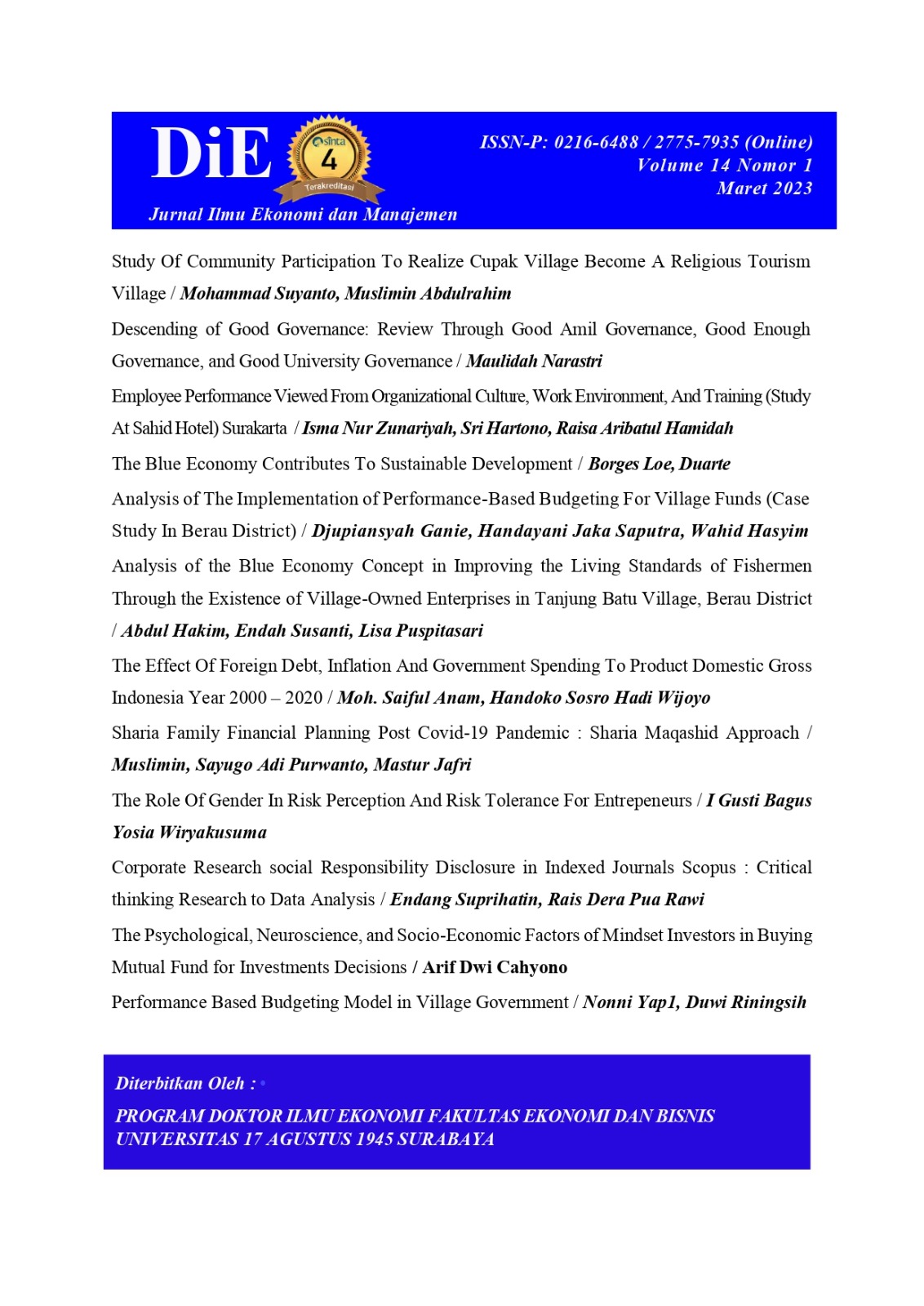THE BLUE ECONOMY CONTRIBUTES TO SUSTAINABLE DEVELOPMENT
DOI:
https://doi.org/10.30996/die.v14i1.8338Keywords:
Blue Economy, Contribution, Sustainable DevelopmentAbstract
Wealth of natural resources needs to be utilized optimally because it can support economic growth, welfare, livelihoods to sustainable development. Efforts to utilize this can be implemented including the blue economy. This study aims to determine the implementation of the blue economy to contribute to sustainable development. This study used a qualitative research method with a descriptive approach, while the data collection technique was carried out by means of a literature study through exploration of journals, books, and other information relevant to the study studies obtained through the official websites of Google Scholar and Scopus with Quartile 1 to 2 qualifications. Research results shows that the Blue Economy reduces the number of unemployed. In addition, the Blue Economy has the power to get better marine ecosystem governance, lower emissions, fairer health standards and become a player in fighting climate change where all of these things can support the creation of sustainable development.
Keywords: Blue Economy, Contribution, Sustainable Development
Downloads
References
growth in the SAARC coutries. Maritime Business Review, 5(3), 253–268.
Andjelka, Mihajlov 2010: O Opportunities and challenges for a sustainable energy
policy in SE Europe: SE European Energy Community Treaty Renewable and Sustainable Energy Reviews 14 (2): 872-875.
Ashfaq, M. Y., Al‐Ghouti, M. A., Qiblawey, H., Zouari, N., Rodrigues, D. F., &
Hu, Y. (2019). Use of DPSIR framework to analyze water resources in Qatar and overview of reverse osmosis as an environment friendly technology. Environmental Progress & Sustainable Energy, 38(4), 13081.
Bax, N., Novaglio, C., Maxwell, K. H., Meyers, K., McCann, J., Jennings, S., &
Carter, C. G. (2022). Ocean resource use: building the coastal blue economy. Reviews in Fish Biology and Fisheries, 32(1), 189–207.
Boretti, A., & Rosa, L. (2019). Reassessing the projections of the world water
development report. NPJ Clean Water, 2(1), 1–6.
Brilha, J., Gray, M., Pereira, D. I., & Pereira, P. (2018). Geodiversity: An
integrative review as a contribution to the sustainable management of the whole of nature. Environmental Science & Policy, 86, 19–28.
Caponera, D. A., & Nanni, M. (2019). Principles of water law and administration:
national and international. Routledge.
Corfee-Morlot, J., Kamal-Chaoui, L., Donovan, M. G., Cochran, I., Robert, A., &
Teasdale, P. (2009). Cities, climate change and multilevel governance.
Daly, J., Willis, K., Small, R., Green, J., Welch, N., Kealy, M., Hughes, E., Daly,
J., Willis, K., Small, R., Green, J., Welch, N., Kealy, M., & Hughes, E. (2007). A hierarchy of evidence for assessing qualitative health research. Journal of Clinical Epidemiology, 60 (1), 43–49.
De Groot, R. S. (1987). Environmental functions as a unifying concept for ecology
and economics. Environmentalist. 7(2), 105–109.
Gjerde, K., Boteler, B., Durussel, C., Rochette, J., Unger, S., & Gjerde, K. (2018).
Wright ‚G.,‘. Conservation and Sustainable Use of Marine Biodiversity in Areas Beyond National Jurisdiction: Options for Underpinning a Strong Global BBNJ Agreement through Regional and Sectoral Governance’, STRONG High Seas Project.
Jabeen, F., Rahman, Q. I., & Siddiq, M. A. (2021). Studies Polymeric Ceramic
Membranes for Water Treatment. Medicinal and Environmental Chemistry: Experimental Advances and Simulations, 82.
Kusangaya, S., Mazvimavi, D., Shekede, M. D., Masunga, B., Kunedzimwe, F., &
Manatsa, D. (2021). Climate Change Impact on Hydrological Regimes and Extreme Events in Southern Africa. In Climate Change and Water Resources in Africa, 87–129.
Lélé, S. M. (1991). Sustainable development: a critical review. World
Development, 19(6), 607–621.
Martinez-Vazquez, R. M., Milan-Gracia, J., & Valenciao, J. de P. (2021).
Challenges of the Blue Economy: evidence and research trends. Environmental Sciences Europe SpringerOpen, 22(61), 1–17.
Morgan, P. J., Huang, M. C., Voyer, M., Benzaken, D., & Atsushi, W. (2022).
BLUE ECONOMY AND BLUE FINANCE Toward Sustainable Development and Ocean Governance. ANCORS.
Pathak, V., Jena, B., & Kalra, S. (2013). Qualitative research. Perspectives in
Clinical Research, 4(3). https://doi.org/https://doi.org/10.4103/2229-
3485.115389
Pauli, G. A. (2010). The blue economy: 10 years, 100 innovations, 100 million
jobs. Paradigm publications.
Sjöstrand, K., Lindhe, A., Söderqvist, T., Dahlqvist, P., & Rosén, L. (2019).
Marginal abatement cost curves for water scarcity mitigation under uncertainty. Water Resources Management, 33(12), 4335–4349.
Sneddon, C., Howarth, R. B., & Norgaard, R. B. (2006). Sustainable development
in a post-Brundtland world. Ecological Economics, 57(2), 253–268.
Spalding, M. J. (2016). The New Blue Economy: the Future of Sustainability. (a
blog on the “Ocean Sustainability Science Symposium”). Accessed February 9, 2023. https://www.oceanfdn.org/blog/ocean-sustainability-and-globalresource-management
Wenhai, L., Cusack, C., Baker, M., Tao, W., & Mingbao, C. (2019). Successful
Blue Economy Examples With an Emphasis on International Perspectives. Frontiers in Psychology, 6, 1–14.
Downloads
Published
Issue
Section
License
The author who will publish the manuscript at DiE: Jurnal Ilmu Ekonomi dan Manajemen, agree to the following terms:
1. Authors retain copyright and grant the journal right of first publication with the work simultaneously licensed under a Creative Commons Attribution ShareAlike License that allows others to share the work with an acknowledgment of the work's authorship and initial publication in this journal.
2. Authors are able to enter into separate, additional contractual arrangements for the non-exclusive distribution of the journal's published version of the work (e.g., post it to an institutional repository or publish it in a book), with an acknowledgment of its initial publication in this journal.
3. Authors are permitted and encouraged to post their work online (e.g., in institutional repositories, pre-prints sites or on their website) prior to and during the submission process, as it can lead to productive exchanges, as well as earlier and greater dissemination of published work








